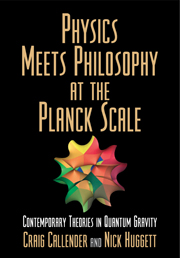Book contents
- Frontmatter
- Contents
- Preface
- 1 Introduction
- Part I Theories of Quantum Gravity and their Philosophical Dimensions
- 2 Spacetime and the philosophical challenge of quantum gravity
- 3 Naive quantum gravity
- 4 Quantum spacetime: What do we know?
- Part II Strings
- Part III Topological Quantum Field Theory
- Part IV Quantum Gravity and the Interpretation of General Relativity
- Part V Quantum Gravity and the Interpretation of Quantum Mechanics
- References
- Notes on contributors
- Index
2 - Spacetime and the philosophical challenge of quantum gravity
Published online by Cambridge University Press: 15 December 2009
- Frontmatter
- Contents
- Preface
- 1 Introduction
- Part I Theories of Quantum Gravity and their Philosophical Dimensions
- 2 Spacetime and the philosophical challenge of quantum gravity
- 3 Naive quantum gravity
- 4 Quantum spacetime: What do we know?
- Part II Strings
- Part III Topological Quantum Field Theory
- Part IV Quantum Gravity and the Interpretation of General Relativity
- Part V Quantum Gravity and the Interpretation of Quantum Mechanics
- References
- Notes on contributors
- Index
Summary
Introduction
Prologue
Any branch of physics will pose various philosophical questions: for example about its concepts and general framework, and the comparison of these with analogous structures in other branches of physics. Indeed, a thoughtful consideration of any field of science leads naturally to questions within the philosophy of science.
However, in the case of quantum gravity we rapidly encounter fundamental issues that go well beyond questions within the philosophy of science in general. To explain this point, we should first note that by ‘quantum gravity’ we mean any approach to the problem of combining (or in some way ‘reconciling’) quantum theory with general relativity. An immense amount of effort has been devoted during the past forty years to combining these two pillars of modern physics. Yet although a great deal has been learned in the course of this endeavour, there is still no satisfactory theory: rather, there are several competing approaches, each of which faces severe problems, both technical and conceptual.
This situation means that there are three broad ways in which quantum gravity raises philosophical questions beyond the philosophy of science in general.
Each of the ‘ingredient theories’ – quantum theory and general relativity – poses significant conceptual problems in its own right. Since several of these problems are relevant for various topics in quantum gravity (as Chapter 8 of this volume bears witness), we must discuss them, albeit briefly. We will do this in Section 2.2, to help set the stage for our study of quantum gravity. But since these problems are familiar from the literature in the philosophy, and foundations, of physics, we shall be as brief as possible.
[…]
- Type
- Chapter
- Information
- Physics Meets Philosophy at the Planck ScaleContemporary Theories in Quantum Gravity, pp. 33 - 89Publisher: Cambridge University PressPrint publication year: 2001
- 46
- Cited by

